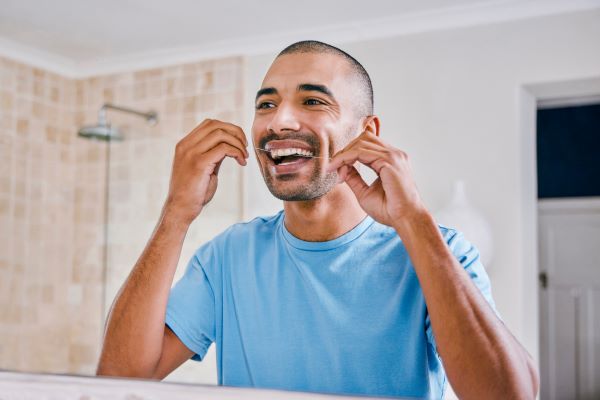Here’s the tooth: maintaining proper oral hygiene not only ensures a dazzling smile, it plays a major role in your overall health and wellbeing.
“Countless studies have shown that what happens in the mouth doesn’t stay in the mouth,” says Dr Janani Ravichandran, dentist and oral health promoter for the Australian Dental Association (ADA). “Neglected oral health can affect the rest of the body with serious cardiovascular events, type 2 diabetes and Alzheimer’s all potential outcomes.”
If that’s not enough motivation to brush up on your dental game, we don’t know what is.
From fluoride to flossing, these are our top dental tips to keep your teeth and gums—not to mention the rest of you—healthy.
1. Master your toothbrush technique
There’s one question dentists are routinely asked when it comes to toothbrushes: manual or electric?
While some studies show that electric toothbrushes are generally more effective at removing plaque, it’s important to remember that a toothbrush is only as effective as its user.
“A manual toothbrush can be just as effective as an electric toothbrush if used correctly,” says Dr Cristina Dumitrache of Surrey Hills Family Dental Clinic in Melbourne. “While electric toothbrushes can offer certain advantages, such as consistent brushing motion and built-in timers, a manual toothbrush can achieve comparable results with proper technique and diligence.”
However, your dentist may recommend using an electric toothbrush if you:
- have difficultly holding and controlling a manual toothbrush
- have braces
- have gum disease.
Whichever toothbrush you choose, make sure you brush for at least two minutes at a time. Brush your teeth gently in circular motions, taking care to reach the inside, outside and surfaces of your teeth.
Top tip: Brush the teeth in each corner of your mouth for 30 seconds to help you keep track of your brushing time. Four corners, each brushed for 30 seconds will equal the recommended 2 minutes of brushing.
2. Brush twice a day with fluoride toothpaste
The toothpaste you use is just as important as how you use it—that’s twice day, preferably after meals and before bedtime. That’s why the ADA recommends using fluoride toothpaste.
“Fluoride helps to prevent tooth decay, strengthen tooth enamel, and reduce the risk of cavities,” agrees Dr Dumitrache.
The next time you’re grocery shopping, look for the ADA seal of approval when choosing your toothpaste.
Top tip: After brushing, spit your toothpaste instead of rinsing your mouth with water, as rinsing can wash away the protective benefit of fluoride.
3. Get a dental check-up every 6 to 12 months
Regular visits to the dentist are key to maintaining healthy teeth and gums. Aim to schedule a dental check-up every 6 to 12 months, even if your teeth and gums appear healthy. Regular dental check-ups are an opportunity for your dentist to assess your oral health, give your teeth a professional clean, and detect any potential issues—from cavities to gum disease and oral cancer—early on. Early intervention by your dentist can help prevent minor dental problems from developing into more serious conditions.

Teeth. You’d literally suck without them.
Our 100% back on dental check-ups are just one of the ways you can get great value from our extras covers. Learn more about how extras cover can help you take control of your health & wellbeing.
Read more: How often should you get your teeth cleaned by a dentist
4. Eat well for good oral health
While good dental hygiene is important for oral health, Dr Dumitrache says it cannot fully compensate for a poor diet. The food we eat plays a major role in our oral health.
“Sugary and acidic foods and drinks fuel bacteria that cause tooth decay,” she says. “These substances can erode tooth enamel, leading to cavities and gum disease. Conversely, a diet rich in calcium, found in dairy products and leafy greens, strengthens enamel and bones, reducing the risk of dental problems.”
Dr Dumitrache recommends foods rich in vitamin C—like fruit and vegetables—to support gum health and prevent inflammation and gum disease.
5. Stay hydrated
Where would we be without water? Nowhere, and your teeth are no different.
Drinking water throughout the day helps your mouth produce saliva—“a natural cleanser”, says Dr Dumitrache.
“Saliva also contains minerals like calcium and phosphate, which help remineralise and strengthen tooth enamel, protecting against cavities and enamel erosion,” she says.
Drinking tap water is also another way of getting fluoride to your teeth. Water fluoridation (the process by which fluoride is added to drinking water) is available in most parts of Australia and has been for years, thanks to a nationwide public health strategy to help prevent tooth decay.
6. Use mouthwash before you brush your teeth
Like flossing, mouthwash should not replace regular brushing. Instead, it can form part of a larger dental routine.
“Choose a mouthwash that contains fluoride and that is alcohol-free, as alcohol-based mouthwashes can contribute to dry mouth and other oral health issues,” says Dr Dumitrache.
Top tip: Use mouthwash before you brush your teeth, as mouthwash can loosen food particles and plaque, making them easier to remove during brushing. Using mouthwash before brushing can also help ensure that the fluoride from toothpaste remains on your teeth longer.
7. Yes, you should floss
We all know we should be flossing after our meals, but 3 in 4 Australians admit to rarely or never flossing, according to a recent survey by the ADA. That’s not good news for our oral health. According to Dr Dumitrache, brushing alone won’t cut it.
“While brushing after every meal can help maintain oral health, it doesn’t replace flossing,” she says. “Flossing specifically removes plaque and food particles from between teeth and below the gumline where toothbrushes can't reach.”
Dr Dumitrache concedes that it can be hard for some people to get into the habit of regular flossing. If that’s you, here are her top tips to help you get started.
- Start small: Begin with flossing a few times a week and gradually increase to daily flossing.
- Use reminders: Set a daily reminder on your phone or place sticky notes on your bathroom mirror to remind you to floss.
- Find the right tool: If you find traditional floss difficult, try floss picks, water flossers, or interdental brushes.
- Reward yourself: Create a reward system for yourself when you floss regularly.
